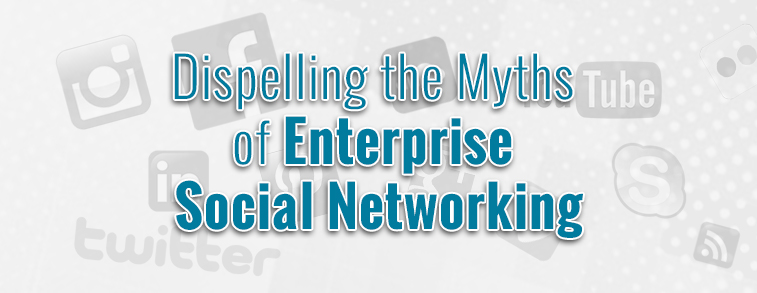Dispelling the Myths of Enterprise Social Networking


Dispelling the Myths of Enterprise Social Networking
An internal Social Network for your organization definitely sounds like an exciting proposition. But not everyone is willing to embrace change. Being well informed about the benefits of Enterprise Social Networking will help refute the skepticism. Most of the companies have wrong or outdated assumptions of Enterprise Social Networking which stop them from exploring the possibilities. Here are the top 4 misperceptions about Enterprise Social Networking:
It’s just like other Social Networks: Enterprise social networks are very often compared to social networks like Facebook. While it is true that most of the features and interface of an Enterprise Social Network will be similar to Facebook, but if we dig deeper there is a world of difference between them. The conversations and content that is shared over Enterprise Social Networks are mostly work related unlike Facebook where the conversations are personal. Most of the users spend a long time Facebook, companies assume that they will end up spending the same amount of time on Enterprise Social Networks as well, this cannot be far from the truth. Enterprise Social Networks are next phase in corporate collaboration and communication. As the Enterprise Social Networks are closely monitored by the employers, the employees are bound to post insightful content.
Enterprise Social Networks aren’t secure: Security concerns regarding Enterprise Social Networking are legitimate, and companies fear that sensitive information might be compromised. These concerns aren’t just limited to internal Social Networks but also valid for other enterprise applications like e-mail and CRM. The current Enterprise Social Networking products offer comprehensive security features which are found in other enterprise products like- running the product within company firewalls and over Virtual Private Networks (VPN’s). The security of a product largely depends on how it has been implemented rather than the category of the product.
Employees won’t use it: It takes a certain amount of time for the full adoption of a new product by the employees. The organization needs to set proper goals in terms of how the product will solve the current problems faced by the employees, will it facilitate better communication? Setting such goals will convince the employees about the value of the product and will gradually increase engagement. Organizations assume that the older employees are not likely to use social products, but research seems to suggest otherwise. Forrester Research indicates that the demand for Social is more from the ‘baby boomers’ (the generation born between the years 1946 and 1964).
Enterprise Social Networks aren’t productive: Businesses often question as to how Enterprise Social Networks will aid productivity. Enterprise Social Networks, in fact work better than Knowledge Management and e-mail systems. Employees get a new flexible platform for collaboration and can leverage the tools which weren’t previously available. For instance, if a particular employee has a query about a technical requirement, he can post that query on the network and can ‘crowdsource’ for answers from other employees.
‘Sociodesk’ (www.sociodesk.com) is an Enterprise Social Networking Platform developed by Aress Software. Sociodesk has several collaborative features for employees, which can aid in improving productivity and help employees connect better.
Category: Featured
Recent Posts
-
GenAI & Data Engineering
From ‘Back-Office’ to ‘The Heart of the Business’
-
GenAI & Data Engineering
Aress OrderIt: Building an Intelligent Quick Commerce Delivery Platform with AI-Powered Optimization
-
24x7 Technical Support
Top 10 MSP Trends Driving Scale, Security, and Profitability in 2026
-
GenAI & Data Engineering
The 2026 Blueprint: 4 Pillars of Effective Cloud Data Management
-
Digital
Why Traditional QA Audits Fail at Scale in Contact Centers
 +91 253 6630710
+91 253 6630710 781.258.1274
781.258.1274 +44 (0) 7446 87 37 97
+44 (0) 7446 87 37 97